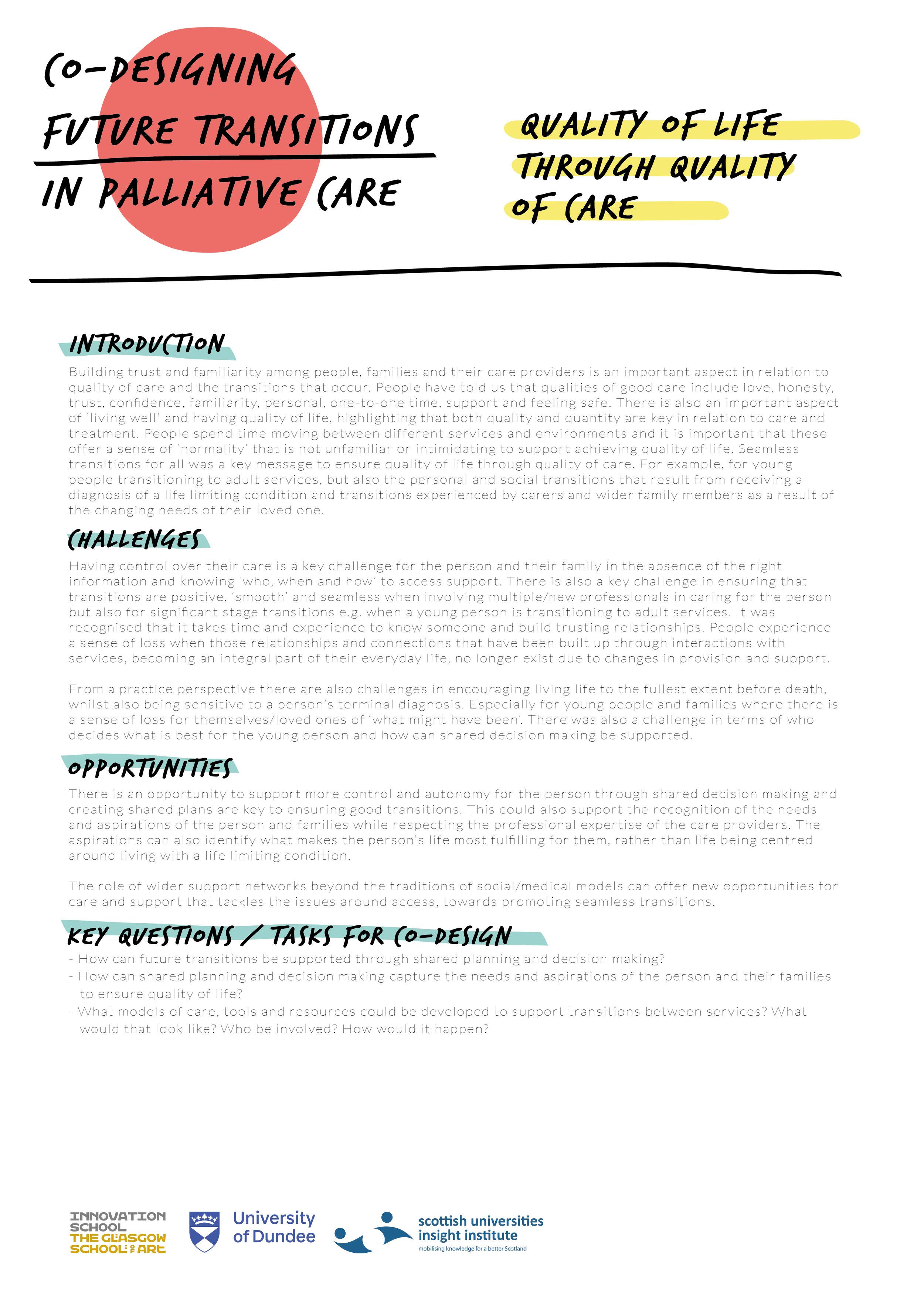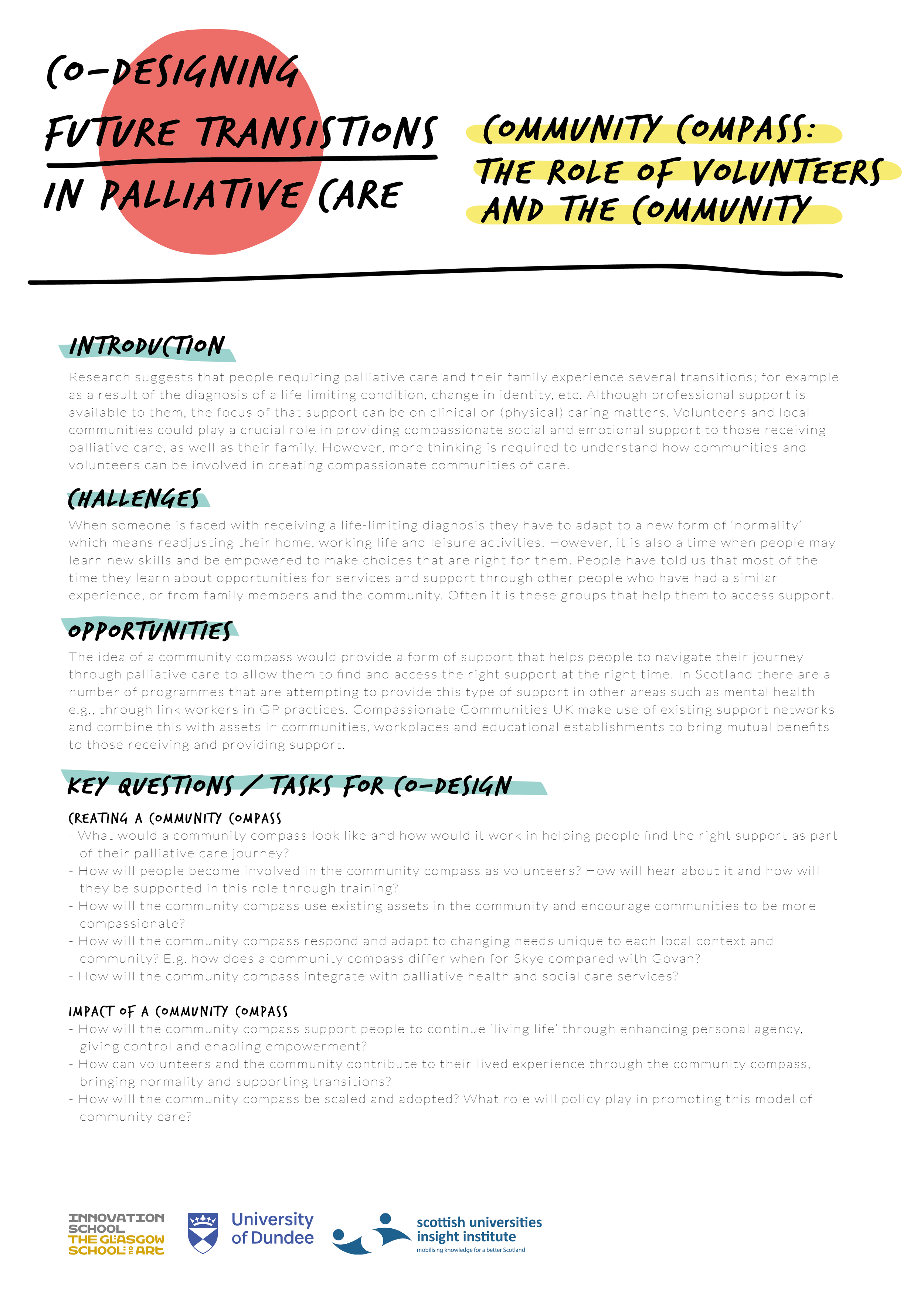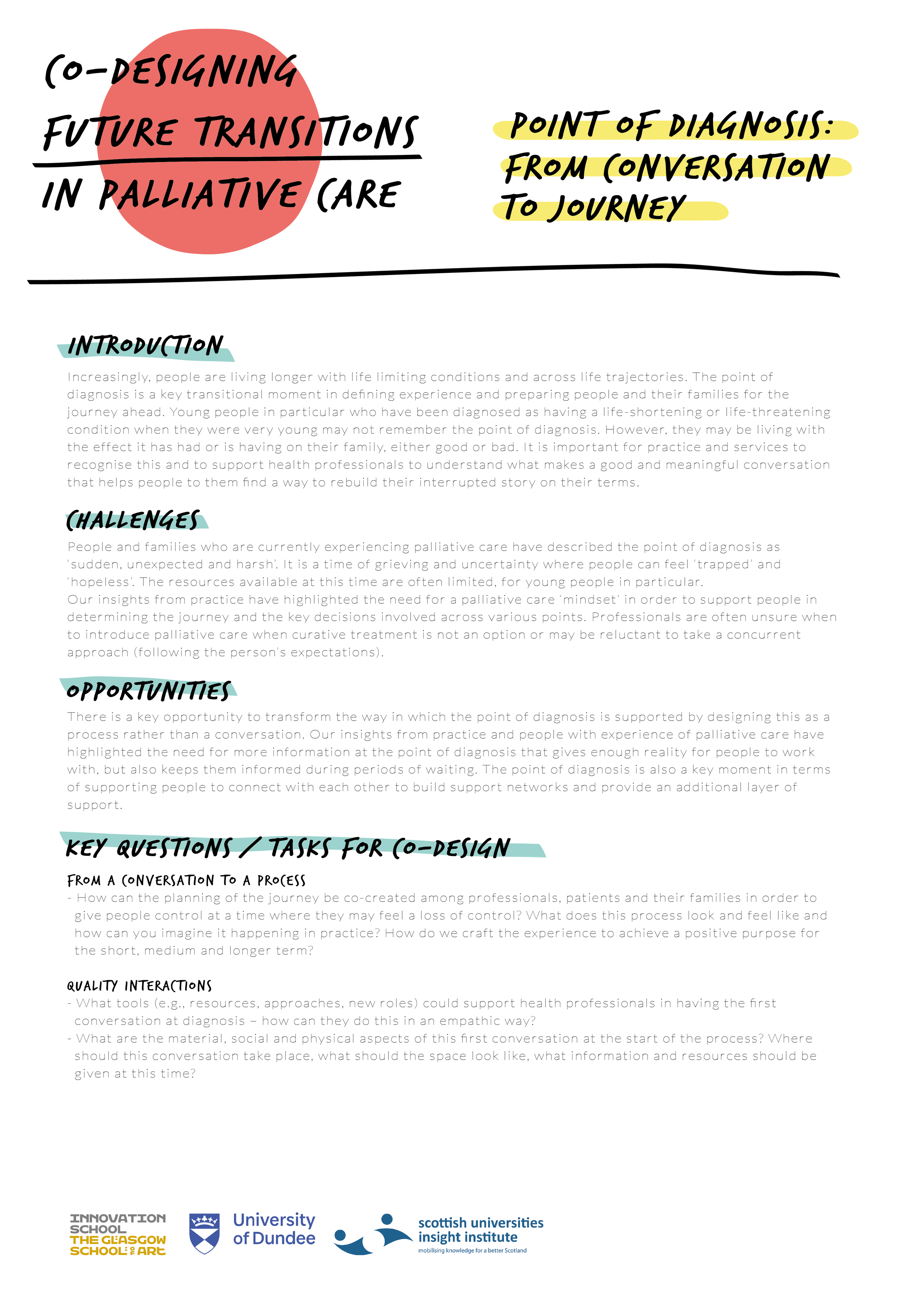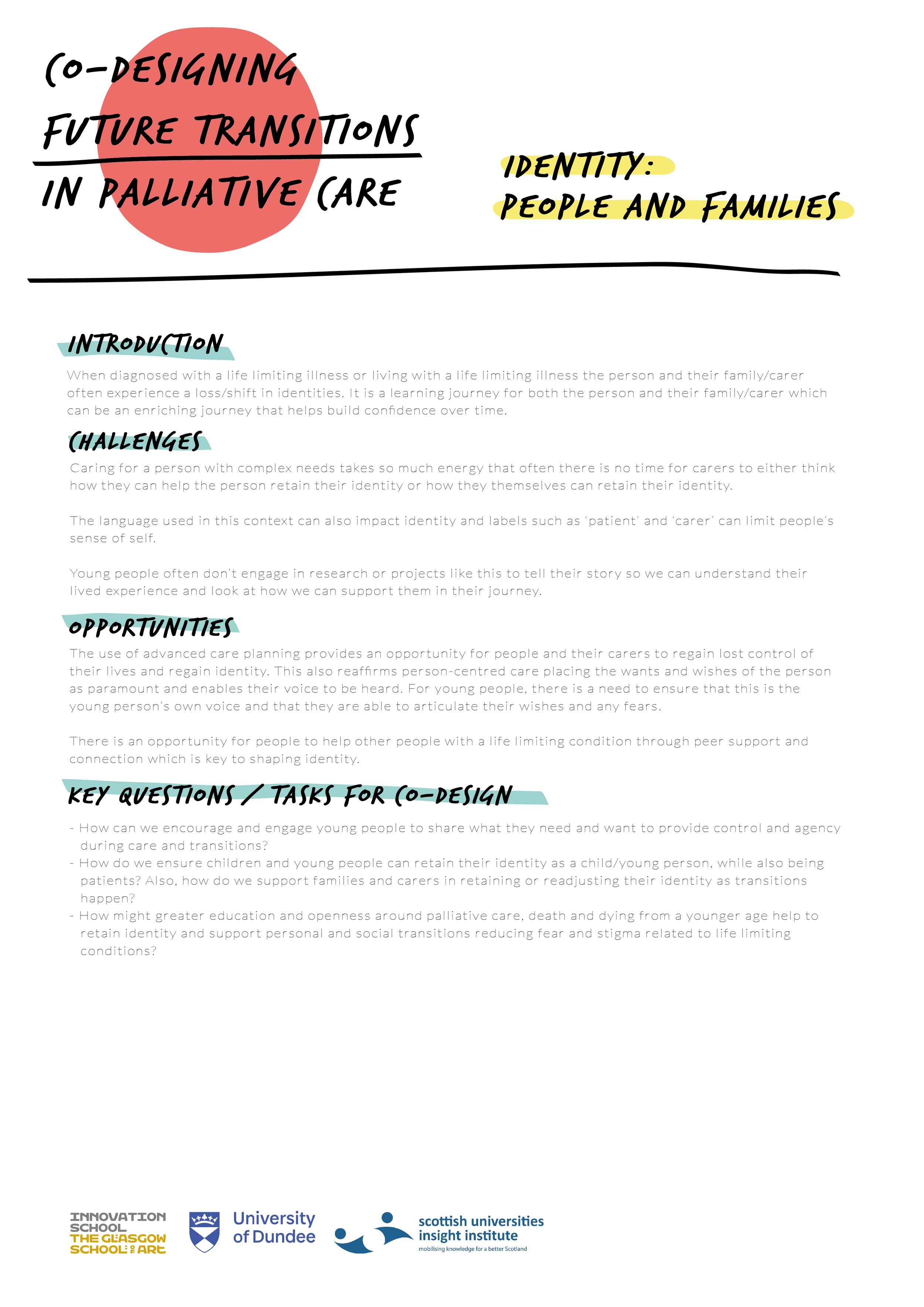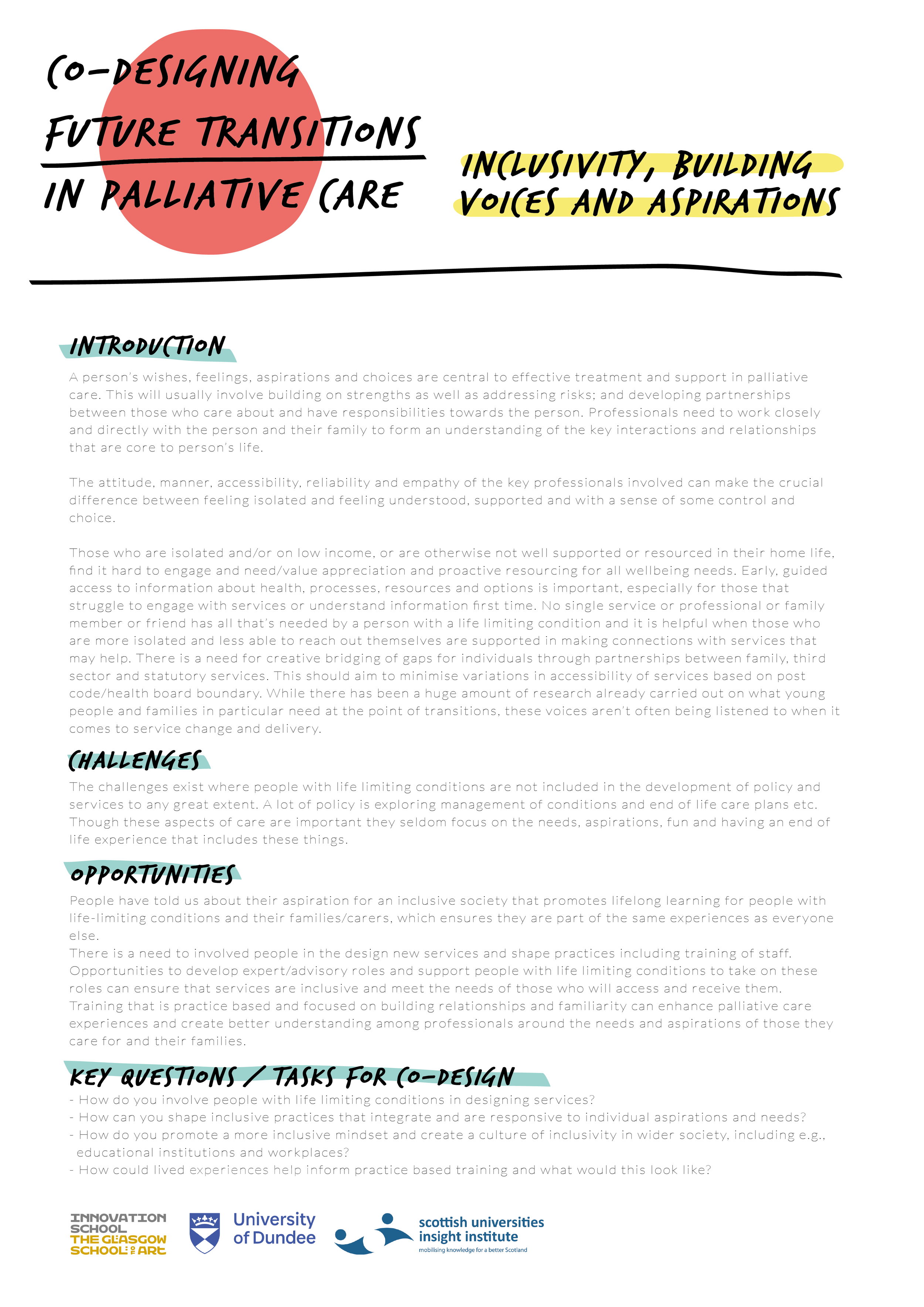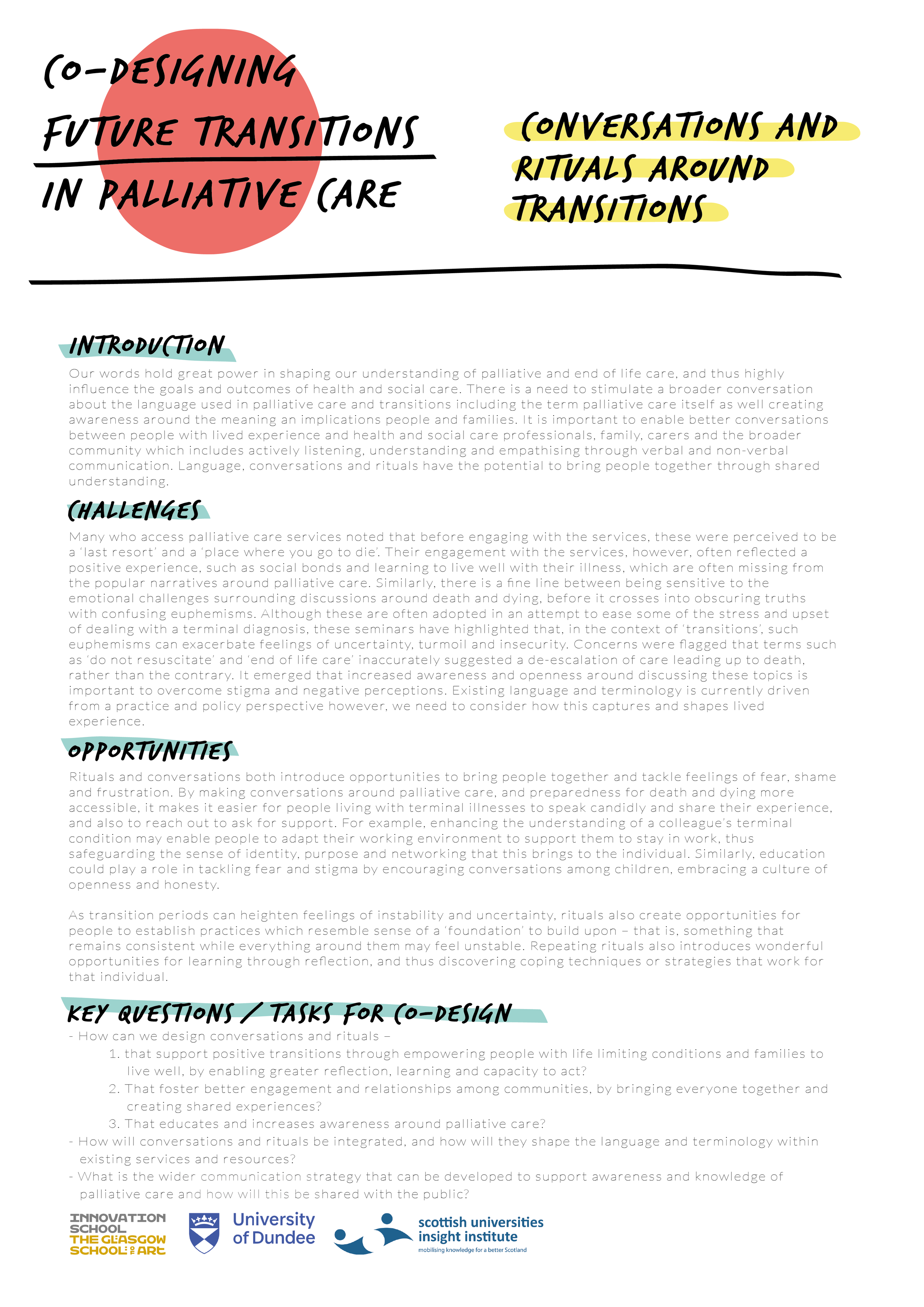Future Transitions in Palliative Care
care across the life course for people living with life-limiting conditions
Background
Funded by the Scottish Universities Insight Institute (SUII), the programme explored the future of palliative care for people living with life limiting conditions to build a contextual understanding of care needs and aspirations across the life course and scope future care models that support the development of person-centred care towards Scotland 2030. There is a need to focus on positive and preferable destinations of care where the ethos and values of services provide a seamless transition for people living with life limiting conditions, regardless of life stage.
Transitions of care are not simply focused on the person receiving care but also the wider care circles, such as family, friends, volunteers, practitioners delivering care, as well as policy and decision makers who impact the care experience. As such, the programme built upon the existing active network of cross sector organisations, practitioners, families and people with lived experience of services together, ensuring all voices are heard.
The programme provides a way to build the foundations for innovation in palliative care pathways for people living with life limiting conditions at the ‘front line’ at points of transition to set the direction towards 2030. Our approach is underpinned by the need to develop innovations based on the ‘right’ conditions and principles by placing interactions between people and their care circle at the core of care delivery to enable conversations that are centered around aspirations for care and thus contribute to seamless transitions for people of all ages.
The programme is a multi-institutional collaboration led by The Glasgow School of Art and the University of Dundee. (More information on the programme team can be accessed on the SUII website.)
Programme aims
Bringing together a multidisciplinary team, and directly involving people with life limiting conditions and their families and carers, the programme aimed to explore and understand the care context and needs during particular life stages and transitions towards achieving person-centred care through designing preferable future scenarios that create sustainability for communities and improve quality of life.
The key objectives were:
To provide a platform to bring forth the lived experiences of people with life limiting conditions and those who have been impacted by life limiting conditions, alongside other views and experiences to inform what meaningful care should be.
To facilitate knowledge exchange among academics, health and social care professionals, education and third sector practitioners, volunteers, and policy and decision makers, with a view to provide person-centered palliative care across the lifespan.
To consolidate the insights generated through creative engagement across the interactive seminars to identify research, practice and policy priorities for future needs across the life course for people with life limiting conditions and their families.
Methodology
The programme employed a design-led approach to a series of creative engagements to bring together the programme team, participants and other external partners to explore and roadmap future palliative care transitions for Scotland 2030. The creative engagements provided a space to share research evidence (Creative Seminar), gather lived experiences from people with life limiting conditions, and from their wider circles of care including family, and practitioners (Flurries); and facilitate knowledge exchange by bringing these stakeholders together with policymakers, to identify key policy and practice priorities for meaningful future palliative care needs across the life course (Co-design Workshop).
Illustration credit: Tessa Mackenzie
The development of a creative and participatory design approach was a central element of the programme in stimulating productive discussion through the creative seminar, flurries and co-design workshop. The Flourish process (McAra-MCWilliam et al., 2014) informed the intent of the programme by embedding qualities of life, personhood and collective wellbeing at the heart of the engagements. The open and emergent process provided flexibility to allow the programme to grow in terms of the thematic areas explored, and expand the range and diversity of participation. The differing scale of participation across the key programme events allowed us to create spaces bespoke to the context of each engagement and participant group.
Across the programme this approach allowed us to integrate lived experience, research, practice and policy perspectives to provide an inclusive space for knowledge exchange and co-design. The use of visual and participatory design methods supported creative exploration and sustained motivation and engagement.
Creative seminar video
Video credit: Louise Mather, No Middle Name
FINDINGS
A number of key themes emerged from the analysis across the programme:
Normalising language and terminology
Point of diagnosis as a key moment
Shifting identities
Support from volunteers and the wider community
Including all voices and aspirations
Quality of care for life and wellbeing
Creating meaning and legacy at the end of life
Please download the full report to read more about the insights and themes.
Based on these key themes, six co-design briefs were created by the programme team to identify opportunities for the future and to support co-design of future transitions during the final workshop.
co-design workshop briefs
Co-design Outputs
In response to the co-design briefs, participants created six outputs which correspond to the key themes listed above. The outputs included concepts for future exploration and development, guidelines and actions and potential impact on future experiences of transitions.
Please download the full report for the co-design responses.
Co-design Workshop Video
Video credit: Louise Mather, No Middle Name
Outcomes
Priorities for research, policy and practice
A set of priorities for research, policy and practice have emerged which give direction for future transitions as well as wider palliative care in Scotland.
Research Priorities
The findings across the programme have identified a need to reframe the challenge of transitions to see transitions as something that is positive, rather than focusing on the negative aspects of transitions. Research needs to be directed towards understanding and collecting experiences of positive transitions. Key recommendations focus on the following areas:
Understanding where policy is enabling in palliative care transitions
Understanding the role of community in providing support in palliative care
Overcoming ethical barriers in palliative care research
Translating research into practice and implementation, focusing on best practice and culture
Policy priorities
The findings of the programme highlight the importance of narrative and stories in both informing and underpinning policy and creating accessible language for communicating and translating experiences. Key recommendations focus on the following areas:
Developing a charter for end of life which is reviewed every 5 years
Creating open and transparent language of policy, visual and jargon free
Commissioning based on identity – impact on person-led policy making
Stories underpinning policy to provide context and empower people to adapt/translate to practice
Realistic policy – ‘dynamic risk assessment’
Practice priorities
The findings across the programme highlight the need to provide appropriate and accessible transition services for all. There is a need to instill an ethos of doing ‘with’ rather than ‘to’ or ‘for’. Linking to current health and social care integration, there is need to look at integration in its broadest sense and have opportunities to breakdown silos, working across boundaries to bring everyone involved in the care of a person and their family together to understand roles and skills.
Facilitating conversations around death and dying across education curriculum
Supporting professionals to have conversations around death and dying (particularly with children and young people)
Supporting people to tell their story and create legacy building on practice from dementia and PAMIS (digital passport)
Removing labels and using plain language
Please download the full report for the full set of priorities for research, policy and practice.
Future proposals
Exploring alternative formats for sharing stories and communicating experiences
The need to engage the public and address the wider challenge of raising awareness of palliative care and promoting discussions around death and dying have led to an exploration of ways to support public understanding and increase engagement with these topics. The use of creative storytelling in the ‘flurries’ provided the participants with a platform to share their experience and also explored the way in which this approach allowed that experience to be translated into a visual format that allowed more people to engage with the stories during the co-design.
Discussions about end-of-life and palliative care can be very emotive for people with a life limiting condition, their families, professionals working with them and their community. It is important that children, young people and adults are able to have a voice about their experience of living with life limiting conditions and how it impacts them. Similarly, it is crucial to hear the narratives of those involved in their care. Although this voice is powerful, in wider research it is hidden in a narrative that is written and interpreted by a researcher. It can perhaps be made stronger if expressed in people’s own voices through creative forms, both oral and visual.
Building on the success of the Fibromyalgia and Us comic, future work in this area could develop a comic which will make these voices visible. The comic could include stories of people living with life limiting conditions and their family, and professionals working with them. The development of the comic can be scoped based on data from previous research to inform the types of narratives to focus on and developed through co-designing with people with lived experience. The format of a comic can allow these experiences to be relatable to others in similar scenarios as well as generate awareness of palliative and end of life care among wider audiences. Through adopting an open access format, the comic can be disseminated through platforms and organisations that have a wider reach to the public.
Another proposal is to have a stand up comedy event on death and dying. People with lived experience and their families could be invited to participate by actively sharing their experience or attending to hear the experiences of others. Events can be organised in the form of 3-4 hour workshops in line with the ‘Bright Club’ format. Participants who volunteer to take part and share their experience can be supported in developing skills in stand up comedy. These events can be structured according to the needs of people e.g., shorter events over a longer period.
Programme Reflections
Reflections on the programme and the individual programme activities were sought from seminar and workshop participants and members of the programme team. Participants were invited to complete feedback sheets on the seminar and workshop and were also invited to share their experience of participating through ‘talking head’ videos. Members of the programme team shared their reflections of the programme during one of the collaborative analysis sessions through open questions related to the design of the programme. The following themes emerged:
Breadth and depth of engagement
Ethos of participation
Use of visual tools
New perspectives on the topic
Lessons learned and scope for improvement
Please download the full report to read more about the reflection themes.
Programme Outputs
Lived Experience of Transitions
acknowledgements
We would like to thank all our participants who gave up their valuable time to take part in the seminar, flurries and co-design workshop, and for the support of staff who helped to organise these events. We are also grateful for support from the Scottish Universities Insight Institute programme and colleagues from The Glasgow School of Art for contributing to programme activities.
further information
For more information contact:
Dr Tara French | t.french@gsa.ac.uk
Sneha Raman | s.raman@gsa.ac.uk



